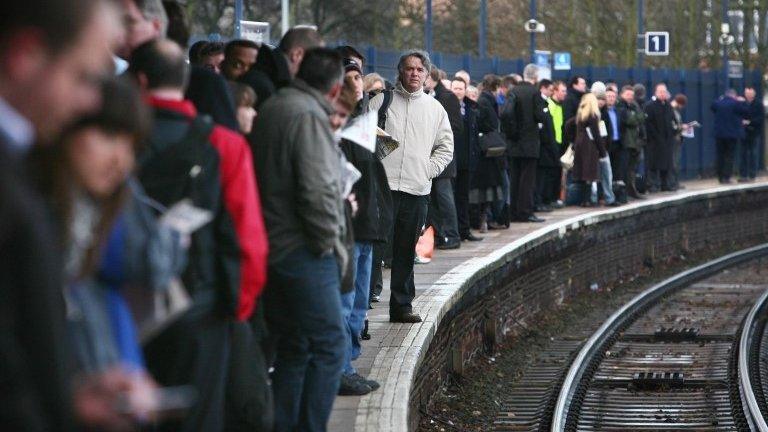Labour 'betrayal' claims over rail upgrades rejected
- Published
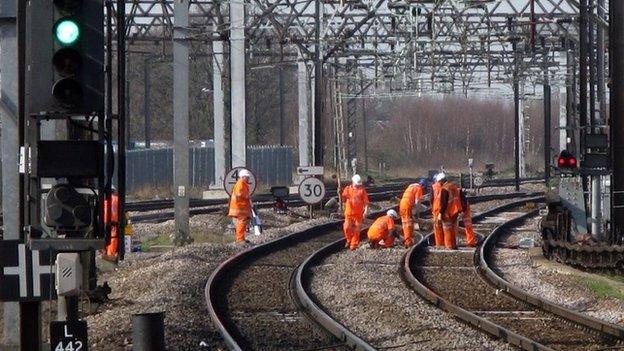
The government insists it only learned recently that promised rail upgrades would have to be delayed, amid Labour claims voters were "betrayed".
Labour said it was clear multi-billion pound plans to electrify Midlands and Pennine lines were in "serious difficulty" before May's election.
They want to know if ministers ignored specific warnings from regulators.
But a Department for Transport source said the extent of the problems became clear "only in the last week or two".
It was announced on Thursday that major parts of a five-year £38bn plan to modernise the UK's rail network would be put on hold amid concerns about whether they could be delivered on budget and wider concerns about Network Rail's performance.
Plans to electrify the Midland Mainline between Sheffield and London and the Transpennine line from Manchester to Leeds are among the projects that will be delayed.

Analysis by political correspondent Ross Hawkins
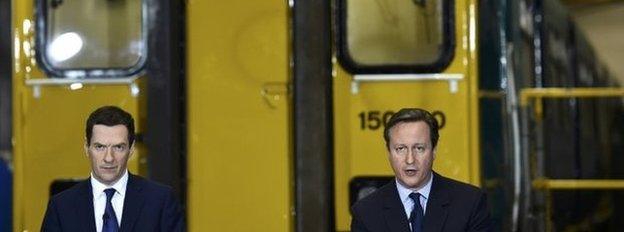
There were plenty of hints electrification projects were running into trouble well before the election.
The regulator, the Department for Transport's top civil servant, Network Rail and even the transport secretary himself made that obvious.
What sources deny is knowing schemes would have to be paused before the election, but only admitting as much afterwards.
Labour are demanding clear answers on that point on the record, and from the prime minister himself.
They will seek to make this a battle not only about competence on the railways, but trust in high office.

Ministers say the plans have been "paused" not stopped but Labour is seeking answers over whether ministers were warned before May's poll that plans were not deliverable.
Rail upgrades are a key part of the Conservatives' 'Northern Powerhouse' strategy and were included in the party's election manifesto.
Chancellor George Osborne has made investments in transport links and other infrastructure across Greater Manchester and Yorkshire a key element of plans to rebalance the UK economy and create a so-called Northern Powerhouse, to rival London and the South-East.
Labour transport spokesman Michael Dugher said the government had "betrayed" voters and broken a series of promises made during the election campaign.
'Embarrassment'
Mr Dugher has written a letter to David Cameron asking if ministers were aware of pre-election warnings from the Office of the Rail Regulator and the Commons Transport Committee about the viability of the plans.
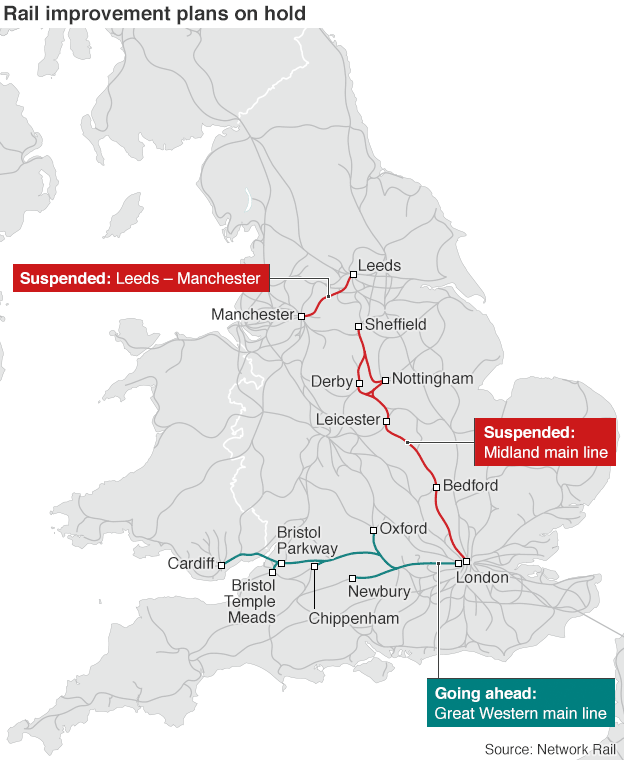
"It appears that despite you and your ministers knowing that these projects were in serious difficulty before the election, you decided to wait until after the election to reveal the extent of the problems before reneging on the commitments you had previously made.
"The public have a right to know if they have been deceived and if members of your government knew for months that these projects would not be delivered as promised."
The government and the Office of the Rail Regulator have both made public statements making clear there were major problems while, in March, Transport Secretary Patrick McLoughlin himself told MPs the date for the Transpennine electrification would slip.

Analysis by BBC North-West political editor Arif Ansari
It's not clear how many people voted Conservative because of the "Northern Powerhouse" strategy.
But it was certainly meant to symbolise that the Tories took the North's prosperity seriously. Transport was critical to the plan.
Cutting journey times between Manchester and Leeds would, in theory, allow the cities to pool their economic potential.
Indeed "HS3", as it was called, was one of the most memorable ideas. It was never formally launched, so it would be wrong to conclude it's been scrapped. But "pausing" electrification of the existing line suggests it's being downgraded.
The Transport Secretary Patrick McLoughlin told the Commons that he hoped a more exciting rail system would still emerge.
If not, many voters in the North could feel let down. And that's dangerous for the Tories who are attempting to revive the Northern economy, not feelings of betrayal.

But the Department for Transport has denied any suggestion that officials knew before the election that electrification would have to be paused but chose not to tell anyone.
"In recent months the government told Network Rail it needed a more accurate assessment of its cost and delivery schedule," a spokesman said. "Network Rail provided that detailed assessment after the election and, as a result, the scale of Network Rail's problems have only now become clear."
Sir Richard Leese, the Labour Leader of Manchester City Council, who worked with Mr Osborne on the Northern Powerhouse plan, said the delays were a "major embarrassment" for the government.
"They've identified Northern Powerhouse, rebalancing the economy, as a key policy. This clearly, if a pause goes on for any length of time, will be a major undermining of that policy.
"If we're not able to move on very, very quickly it will move beyond being an embarrassment for the government and will be a major test of their credibility."
A shake-up of Network Rail's management has seen Sir Peter Hendy, London's transport commissioner, appointed chairman but Sir Richard Branson, the chair of Virgin Rail, has called for the body which owns the UK's rail track to be broken up into regional units.
Transport minister Andrew Jones told the Yorkshire Post, external: "This is a pause, not a stop, and this change to the team will strengthen it to make sure we deliver. We remain hugely ambitious and that is why the budget remains intact."
On routes between Sheffield and London, better services would be delivered before electrification, he insisted. "In the meantime, we will deliver faster trains and better services for passengers on that route."
- Published26 June 2015
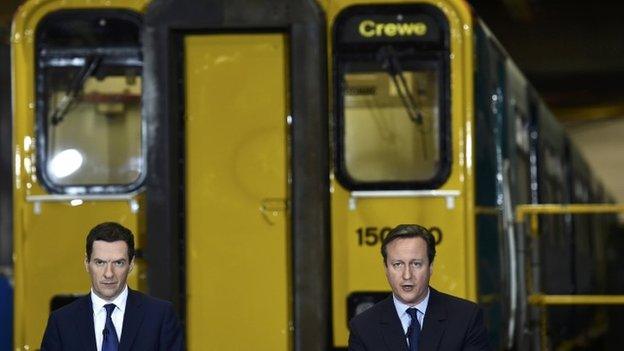
- Published26 June 2015
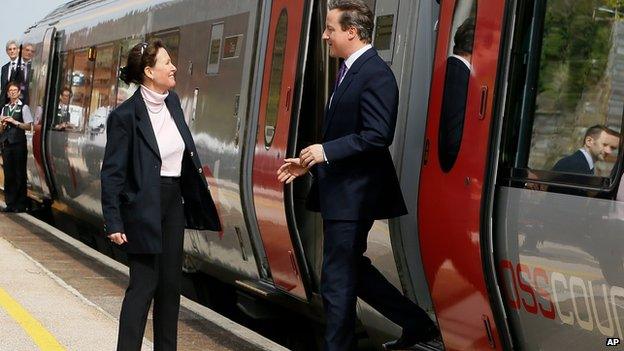
- Published26 June 2015
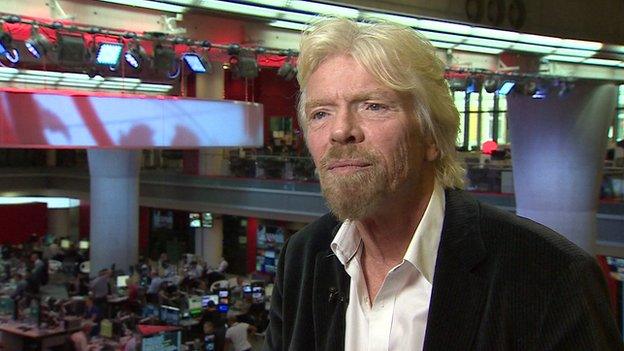
- Published25 June 2015
